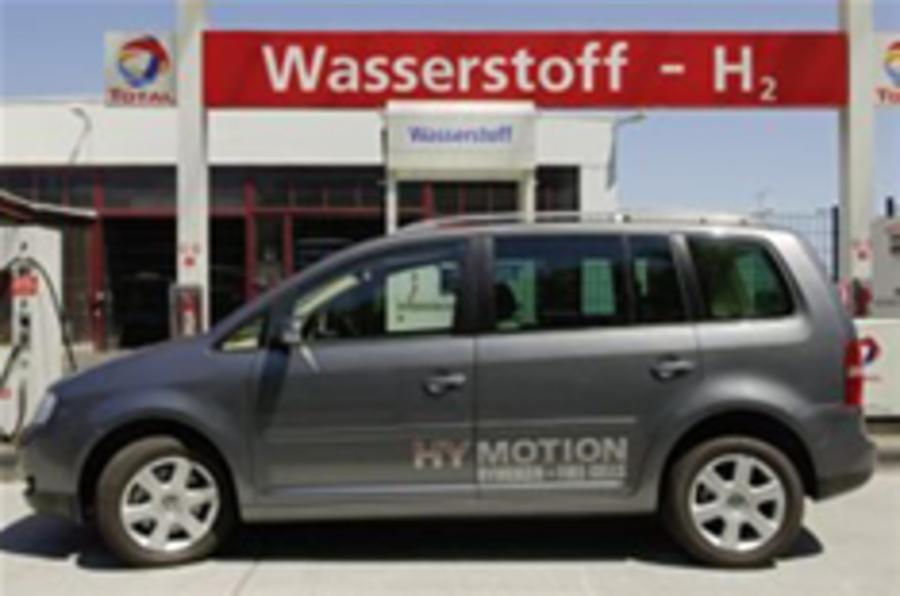One of the most senior forward-thinkers at Europe's bigger car-maker has told Autocar that he thinks hydrogen-powered cars won't turn out to the global emissions panacea that the wider motor industry is cracking them up to be.
Volkswagen's head of research Dr Jurgen Leohold told Autocar that he thinks fuel cell cars like VW's own HyMotion Touran research car (pictured) are not the future of alternative power, and are only really being developed as a sop to ever-tightening emissions laws in places such as California.
Describing them as a “marketing exercise,” he said their inherent problem lies with producing the hydrogen fuel to power them, and in establishing an infrastructure of hydrogen filling stations. "Because hydrogen has to be produced using existing power, CO2 emissions are still an issue," he said.
Instead, Dr Leohold reckons the immediate future of alternative power for cars lies with biofuels and beyond that with battery power, and we’ll see huge improvements in battery technology in the next five years. “You can see it already in mobile phone and computer batteries,” he said.
General Motors has already announced it will put the battery-driven Chevrolet Volt into production by 2010, a decision dependent on a big steps forward in battery technology.






Join the debate
Add your comment
Re: "Fuel cell cars won't save the world"
Sounds like you may know what your talking about, so who am I to disagree with you!
Re: "Fuel cell cars won't save the world"
As a mechanical engineer reading my PhD in biofuel combustion, I must agree, Fuel Cells are way way beyond the realm of applicability for a while to come.
Where to start with their negatives?
1) A fuel cell's weakness begins at it's fuel: You simply can't store hydrogen. There are two methods to store it and both leak. The 7-series Hydrogen car has a 200kg storage system that maintains 9kg of hydrogen, which is enough for 100miles. Unfortunately in 9 days half of the H2 boils off of. London tried to run hydrogen-powered busses for a few months: Refueled on Friday, by monday they'd lose over 40% of their reservoir: The H2 molecules simply floated through the steel high-pressure tube.
2) A fuel cell is in short, a chemistry lab. It's all fine and dandy talking of a car with one, but who told you anyone has any idea how to manufacture such a machine and build in the reliability that is mandated by modern industry? A car must be guaranteed to run for 2 years by law; I don't see anyone picking up the tab when it's discovered X vibrations, Y barometric conditions and Z temperatures cause untold damage to the machinery at work; Billions of run-hours on the Infernal Conmbustion engine have given us knowhow to build this reliability in (almost). Who knows how many years of breakdowns and unacceptable performance fuel cells will have to go through to compete? A moot point, surely, as legislation and law-suits will make it an option best left to the mad with money to throw away.
3) The benefits of a fuel cell aren't in fact that far ahead of a hydrogen-running IC engine. To convert an engine to H2 burning is a few hundred thousand dollars worth of investment in research, and another such sum in terms of tooling. To make a Fuel Cell is millions of dollars at least, and as you can see, the profit margins in Automotive world in these last few decades are deceptively small.
Fuel cells may be the distant future gentlemen and ladies, but the operative word is DISTANT. Certainly past our life-times. The car is too big, too hugely critical a technology to be replaced by a technological whim. Unless absolute-vacuum storage of H2, including said storage for providing it to customers, becomes cheap, safe and easy to provide for each and every vehicle in production, I see spending 1/100th of that research money into improving IC engines a much much better return on research to result.